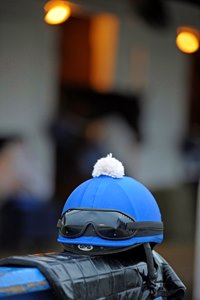Study's Goal: Concussion Management Protocol


The Jockeys' Guild and University of Kentucky will embark on a three-year pilot study, supported by a broad cross-section of Thoroughbred industry organizations, designed to evolve into the first comprehensive concussion management protocol for jockeys.
The announcement of the project was made June 13.
Carl Mattacola, director of the Graduate Athletic Training Program and a professor in the UK College of Health Sciences, will oversee the study at all of Kentucky's Thoroughbred racetracks: Turfway Park, Keeneland, Churchill Downs, Ellis Park, and Kentucky Downs. It is scheduled to begin this summer.
"We want to give the jockeys who suffer head injuries the best science has to offer, and an important first step toward that goal is to generate data from which an appropriate management protocol can be developed," Mattacola said in a release. "This project will leverage the full resources and knowledge base of UK's Sports Medicine Research Institute and the Spinal Cord and Brain Injury Research Center to help create the first national protocol for concussion management in jockeys."
For the study, jockeys will undergo a Sport Concussion Assessment Tool (SCAT 3) test to develop a baseline score so that pre- and post-fall responses can be compared. The SCAT3 is an instrument used to assess sign/symptoms, physical, and cognitive function for concussion.
A specialized health-care provider trained in concussion assessment and sport injury will be available at each track to perform the assessments, the project partners said.
Mattacola said the jockeys will be required to have an active account with the Jockey Health Information System, which stores medical and injury information on riders and will serve as a database for the study.
A licensed athletic trainer, Mattacola received his bachelor's degree in athletic training from Canisius College in Buffalo, N.Y., and his Masters and PhD degrees in sports medicine from the University of Virginia. His research has focused on factors that relate to athletic injuries and rehabilitation.
Officials said that by developing a comprehensive concussion management protocol for jockeys, racing is following the lead of other major sports such as the NFL, NBA, MLS, MLB, NCAA, and NASCAR, as well as international horseracing authorities such as the British Horseracing Authority, the Irish Turf Club, and the Federation Equestre Internationale.
"The pilot study and resulting concussion management protocol will finally bridge the gap that exists between horse racing and other major sports to further protect our human athletes," Jockeys' Guild national manager Terry Meyocks said. "We would like to thank all of the industry organizations that contributed to this important initiative."
The list of supporting organizations includes the five Kentucky Thoroughbred tracks, UK College of Health Sciences, Kentucky Thoroughbred Association/Kentucky Thoroughbred Owners and Breeders, The Jockey Club, Breeders' Cup, Thoroughbred Owners and Breeders Association, National Thoroughbred Association, and National Horsemen's Benevolent and Protective Association.
